Opportunities! News for University of Washington Students with Disabilities Spring 2021
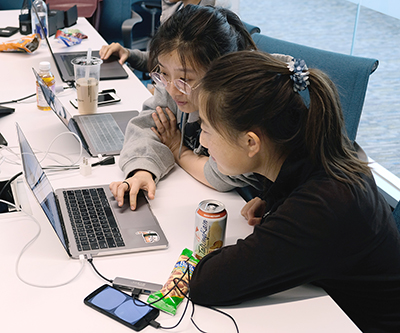
Are You a Student with a Disability Attending the University of Washington?
This newsletter promotes resources for students with disabilities on University of Washington campuses and is created by the DO-IT (Disabilities, Opportunities, Internetworking, and Technology) Center.
This newsletter highlights the following:
- Career & Internship Center events
- Internship opportunities
- Accessible technology
- Campus centers
- Student groups
- STEM and computing resources
- Scholarship opportunities
We sincerely wish you a successful and enjoyable college experience.
Below are the articles of the Opportunities! News for University of Washington Students with Disabilities Spring 2020 newsletter. These articles can also be seen all on one page at the Full Newsletter option.
Note: Some resources may not be available during the pandemic depending on the status of programs, departments, or the University of Washington. All group photos used in this publication were pre-pandemic.
The UW Career & Internship Center Resources and Events
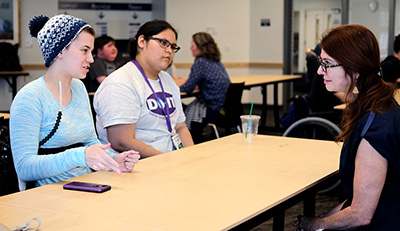
The UW Career & Internship Center Is Now Virtual!
Check the UW Career & Internship Center website to find a variety of resources, including the options below:
- Online Resume Review—get resume feedback over email by filling out the form online.
- Virtual Appointments—connect with one of our coaches via Zoom or phone. Make an appointment now!
- Webinars—find out more about all the webinars offered this spring.
The UW Career & Internship Center
The Career & Internship Centers on each UW campus help students learn about majors, careers, and the labor market. Career counselors are available to help with resume development and improving interview skills. Visit their website.
UW Career & Internship Centers utilize the web-based system Handshake to manage job and internship listings. Find out more about featured jobs and internships at careers.washington.edu/jobs.
The Career & Internship Center website has a resources section with information specific to people with disabilities. It can be accessed by visiting careers.uw.edu/resources/ and utilizing the “Students With Disabilities” filter.

Virtual Events and Presentations
How to Build a Network Workshop
Friday, April 30, 2021, 12:30 – 1 pm
Graduate School Application Workshop
Wednesday, May 5, 2021, 12:30 – 1 pm
Resume Workshop
Monday, May 10, 2021, 1:30 – 2 pm
LinkedIn Lab
Tuesday, May 18, 2021, 11:30 – 12:30 pm
Cover Letter Workshop
Tuesday, May 25, 2021, 12:30 – 1 pm
Preparing for Interviews Workshop
Thursday, May 27, 2021, 12:30 – 1 pm
For more information about these virtual events and to see the full list, visit the Career Center's Student Event Site. Registration is required.
Virtual Career Fairs
College students often attend career fairs to prepare for graduation and plan their future in the workforce. Due to the pandemic, industry recruiters are participating in an increasing number of virtual job fairs to meet potential employees preparing to graduate from college. Even before 2020, virtual job and career fairs were offered as an alternative to in-person events at colleges and universities. This can be helpful for many people, including people with disabilities. But how do virtual job fairs work? Are they beneficial?
Virtual career fairs take place in many different online environments such as chat rooms, webinars, webcasts, or other teleconferencing software. There are often opportunities for job seekers to upload their resumes to recruiters.
Here are some tips on feeling successful at a virtual career fair:
- Look for a fair that has a variety of employers present.
- Have your resume ready to upload or reference when needed.
- Prepare questions to ask the recruiters.
- Test your equipment! Technical issues do come up, so try and give yourself extra time to get set up.
- Dress appropriately, especially if there is a video component of the fair.
- If you require assistive technology (e.g., a screen reader) to access the fair, contact the host in advance to ask if the program is accessible via your technology.
- Companies usually have specific windows of time that they are available to chat with participants—develop a strategy for who you want to talk to and when.
Virtual fairs work for some people but not for everyone. Try it if you’re curious. Being open to new ideas and experiences will give you the tools to succeed in getting your dream job.
|
Virtual Career Fair 101 Tuesday, April 27, 2021, 2:30 – 3:20 pm Learn how to register for Career Fair event sessions in Handshake, how to make a good impression, and how best to prepare for a virtual fair. |
Community Support for People With Disabilities
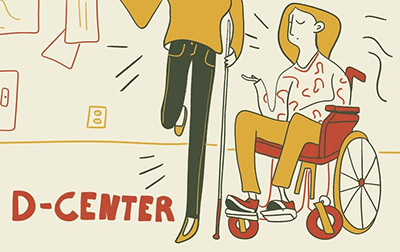
Art by Abigail Dahl (@abigailgracedahl) for The Daily at UW
The D Center continues to operate online! Please stay tuned for announcements for D Center online events and communications of news and resources. For more information, visit the D Center website.
The D Center is seeking stories and lived experiences of disability and d/Deaf community members for the UW Disability Connections Blog. If you are a UW student, staff, faculty, or alumni and have a story, perspective, or experience you would like to share, please fill out their questionnaire.
Accessible Technology Resources on Campus
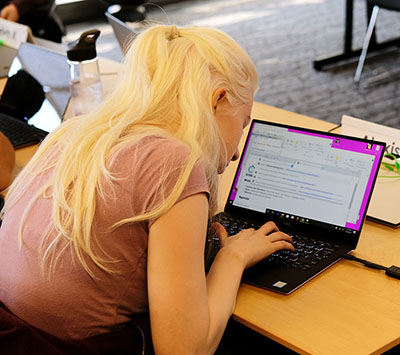
There are many services at the University of Washington to help students with disabilities obtain access to accessible technology. Though the Access Technology Center (ATC) office is closed, many staff are available remotely for questions and meetings.
The Access Technology Center
The Access Technology Center (ATC) on the Seattle campus provides resources to improve access to computing resources for University of Washington students, faculty, and staff. The computers, software, and special equipment in the center and at other locations on UW campuses provide
- access for blind users via speech output or braille;
- screen magnification for people with low vision;
- alternatives to the standard keyboard and mouse;
- speech recognition software as a writing tool;
- tools to make reading and writing easier;
- accessories for comfortable computer use; and
- the capability to produce documents in alternative formats such as e-text, braille, and large print.
For information about assistive technology on your campus, ask your disability services representative. Visit the ATC at the UW Seattle campus when open in Mary Gates Hall, room 064, or consult their website.
Center for Technology and Disability Studies
The Center for Technology and Disability Studies (CTDS) is an interdisciplinary program within the Center for Human Development and Disability and the Department of Rehabilitation Medicine in the School of Medicine. For a list of CTDS projects and activities, visit their website.
Accessible Technology at the UW
The Accessible Technology website provides resources and tips related to IT accessibility, as well as opportunities for community involvement. Check it out online.
Need an alternative, accessible document? Check out Disability Resource Services’s document conversion tool.
Student Resource Centers
Note: Physical locations may not be open. Continue to check their websites for more details and contact information.
D Center
The UW Disability and d/Deaf Culture Center, located in MGH 024, fosters a climate of social justice and pride, centered on universal design, access, and diversity. It cultivates disability and d/Deaf pride by promoting social justice through an inclusive environment, sharing resources for self-advocacy, developing educational programming, engaging stakeholders with principles of universal design, and promoting a transforming socio-cultural understanding of disability. For more information, email dcenter@uw.edu or visit their website.
Learn about upcoming D Center events on their Facebook page.
UW Veterans Center
The UW Veterans Center is a place for veterans to connect with other veterans, gain access to university resources specifically designed for veterans, and find and build their community within the university. Find out more at depts.washington.edu/osfaweb/veterans.
Q Center
The Q Center builds and facilitates queer academic and social community though education, advocacy, and support services. Services and resources include a lending library, discussion forums, meet ups, social space, brief crisis intervention, and referrals. Find out more at depts.uw.edu/qcenter/wordpress/
Student Groups
ASL Club
For more information on the American Sign Language Club, check out their Facebook group.
Mad Campus
Mad Campus is a peer group for students identifying with or experiencing madness, mental illness and/or neurodiversity. Check the D Center website for updated times.
ASUW Student Disability Commission
The Associated Students of the University of Washington Student Disability Commission was established to create communities for individuals with disabilities and their allies by providing programming, resources, and a safe accessible space. For more information, send an email to asuwswdc@uw.edu.
Find More Connections Online
There are over 900 Registered Student Organizations (RSOs) at UW. Take a look at all the clubs campus has to offer by browsing the RSO Directory.
More Opportunities for Students
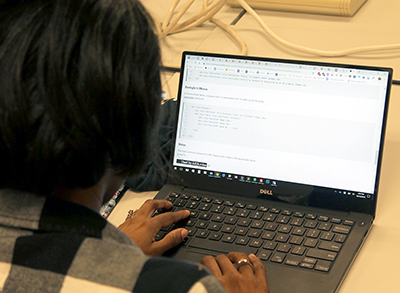
Explore the UW’s Disability Studies Program
Disability studies (DS) at the UW involves a multi-campus interdisciplinary group of faculty, staff, students, and community members, who share an interest in questions relating to society’s understanding of disability. The undergraduate disability studies minor and the individualized studies major in disability studies provide opportunities for students to develop a strong interdisciplinary foundation in the social, legal, and political framing of disability. For more information, visit their website.
Learn About Projects at the Center for Neurotechnology
The Center for Neurotechnology (CNT), located in the Bill & Melinda Gates Center for Computer Science & Engineering, collaborates with partner universities to facilitate advances in neural engineering. The CNT is recruiting UW students with disabilities who are interested in this complex field and brain-computer interface to participate in activities.
For more information, contact Scott Bellman, CNT associate director of diversity, at swb3@uw.edu or visit the CNT website.
Scholarships and College Funding
Check Out DO-IT's Scholarships Website
Learn about scholarships for students with all types of disabilities and interests. Each scholarship includes eligibility, a deadline, and a link to apply. For more information or help applying to scholarships, contact DO-IT to receive editing and support. Learn more by visiting our Scholarships Page.
Explore College Funding for Students with Disabilities
Common forms of financial aid include grants, loans, work study, and scholarships. Many students use a combination of these financial aid resources. To learn more about strategies for funding your education, check out College Funding Strategies for Students with Disabilities.
About DO-IT and This Publication
Disabilities, Opportunities, Internetworking, and Technology
DO-IT serves to increase the participation of individuals with disabilities in challenging academic programs and careers. It promotes the use of computing and networking technologies to increase independence, productivity, and participation in education and employment. Based at the UW Seattle campus, DO-IT works with students preparing for college or currently attending any two- or four-year university.
DO-IT, University of Washington
Sheryl Burgstahler, Director
Scott Bellman, Manager
4545 15th Avenue NE, Suite 100
Seattle, WA 98105
206-685-DOIT (voice/TTY)
doit@uw.edu
www.uw.edu/doit/
Follow DO-IT on Facebook & Twitter!
Join our DO-IT Friends Facebook group, like our Facebook page, or follow us on Twitter to stay in touch!
About this Publication
This publication is a joint venture between DO-IT, the UW Disability Resources for Students offices, and Career Centers on all three UW campuses. Its purpose is to inform UW students with disabilities about some of the many opportunities available to them. It is printed periodically. Submit content suggestions to Kayla Brown, DO-IT Project Coordinator, at 206-685-3648 (voice/TTY) or kayladb@uw.edu.
This publication was developed with funding from the National Science Foundation (CNS‑1042260). The contents do not necessarily represent the policies of the U.S. federal government, and you should not assume their endorsement.
Copyright © 2021, University of Washington. Permission is granted to copy these materials for educational, noncommercial purposes, provided the source is acknowledged.